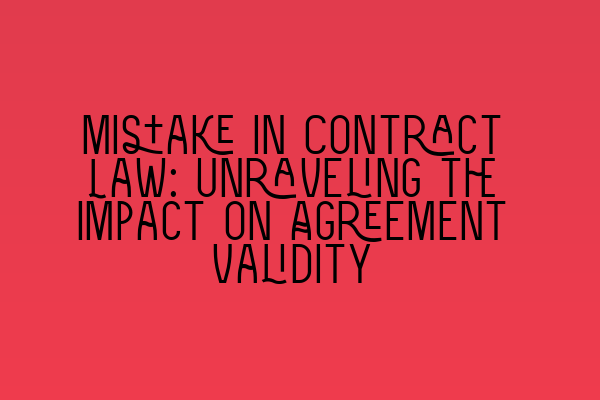Mistake in Contract Law: Unraveling the Impact on Agreement Validity
Welcome to our blog post on the topic of mistake in contract law! In this article, we will be exploring the concept of mistake and its impact on the validity of a contract. Whether you’re studying for the SQE or simply looking to expand your knowledge on contract law, we’ve got you covered. So, let’s dive right in!
Understanding Mistake in Contract Law
In contract law, a mistake refers to an erroneous belief held by one or both parties to a contract at the time of its formation. Mistakes can arise in various forms, such as a mistake of fact or a mistake of law.
A mistake of fact occurs when a party makes an incorrect assumption about a specific fact that is vital to the contract. For example, Party A may mistakenly believe that a piece of artwork is an original Picasso when, in reality, it is a replica. This mistake can have significant consequences in terms of the agreement’s validity and the parties’ obligations.
On the other hand, a mistake of law occurs when a party is mistaken about the legal consequences of their actions. In most cases, mistaken beliefs about the law are not a valid defense to a contract claim. However, there are exceptions to this rule, such as when one party fraudulently misrepresents the law to the other.
The Impact of Mistake on Agreement Validity
When a mistake is present in a contract, it can render the agreement void or voidable, depending on the circumstances. Let’s take a closer look at these two terms:
A void contract is a contract that was never legally binding from the outset. In other words, it is as if the contract never existed. This can occur when both parties were mistaken about a fundamental fact that goes to the heart of the agreement. For instance, if both parties believed the subject matter of the contract was in existence when, in reality, it had been destroyed.
On the other hand, a voidable contract is one that is initially valid but can be later canceled by one of the parties due to a mistake. In such cases, the mistaken party has the option to avoid their obligations under the contract. For example, if Party A sells a piece of property to Party B, mistakenly believing it to be free from any encumbrances, Party B may choose to rescind the contract once they discover the encumbrances.
It is important to note that not all mistakes will automatically render a contract void or voidable. The mistake must typically be a fundamental one that goes to the root of the contract. Minor or inconsequential mistakes may not have a significant impact on the agreement’s validity.
Remedies for Mistaken Contracts
When a contract is found to be mistaken and either void or voidable, the parties may seek remedies to address the consequences. The available remedies will depend on the nature of the mistake and the specific circumstances of the case.
The most common remedies for mistaken contracts include:
1. Rescission: This remedy involves canceling the contract and restoring the parties to their pre-contractual positions. It aims to undo the effects of the mistaken agreement.
2. Rectification: In some cases, a court may order the contract to be rectified or rewritten to reflect the parties’ true intentions. This remedy is typically available when there is clear evidence of a mistake in the contract’s drafting or recording.
3. Damages: In certain situations, the party suffering a loss due to the mistake may be entitled to monetary compensation from the other party.
It is worth noting that the availability of these remedies can be subject to various legal requirements and time limits. Seeking legal advice is crucial to understanding your rights and options in cases of mistaken contracts.
Conclusion
Mistake in contract law can have a significant impact on the validity of an agreement. Whether it is a mistake of fact or of law, the nature and consequences of the mistake will determine whether the contract is void or voidable. Understanding the implications of mistake and the available remedies is important for both legal professionals and those preparing for the SQE.
If you found this article helpful, you may also be interested in reading our related articles:
- Effective Revision Techniques for SQE: Maximizing Retention and Recall
- Top Resources for SQE Preparation: Tools to Help You Succeed
- SQE Mock Debrief Sessions: Analyzing Your Performance for Growth
- The Importance of Mocks in SQE Preparation: A Game Changer
- SQE Answer Keys: Unraveling the Mystery of Correct Answers
